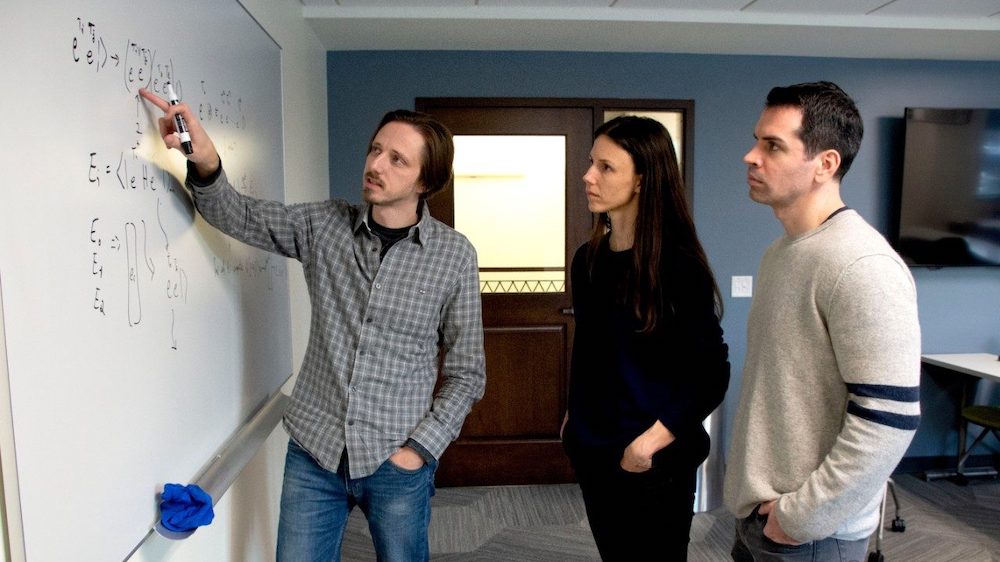
(Left to right) Nick Mayhall, Sophia Economou, and Ed Barnes, all of the Virginia Tech College of Science
A key envisioned use is simulating molecular properties. In the long run, this can lead to advances in materials improvement and drug discovery. But not with noisy calculations confusing the results.
Now, a team of Virginia Tech chemistry and physics researchers have advanced quantum simulation by devising an algorithm that can more efficiently calculate the properties of molecules on a noisy quantum computer. Virginia Tech College of Science faculty members Ed Barnes, Sophia Economou, and Nick Mayhall recently published a paper in Nature Communications detailing the advancement.
Quantum computers are expected to be able to carry out certain kinds of calculations far more efficiently than the "classical" computers in use today. They are similar to classical computers, however, in that they run algorithms by applying sequences of logic gates -- in this case, "quantum gates," which together form quantum circuits -- to bits of information. For today's noisy quantum computers, the problem has been that so much noise would accumulate within a circuit that the computation would degrade and render any subsequent calculations inaccurate. Scientists have had difficulty designing circuits that are both shorter and more accurate.
The Virginia Tech team addressed this issue by developing a method that grows the circuit in an iterative way. "We start with a minimal circuit, then grow it as we add on logic gate after logic gate in short circuits until the computer finds the solution," said Mayhall, an assistant professor in the Department of Chemistry.
A second major benefit of the algorithm is that Barnes, Economou, and Mayhall designed it to adapt itself based upon the molecular system being simulated. Different molecules will dictate their own circuits, uniquely tailored to them.
The interdisciplinary collaboration between Virginia Tech's departments of Chemistry and Physics -- Barnes, Economou, and Mayhall and a team of graduate students and postdocs from both departments -- have received grants from the National Science Foundation and the U.S. Department of Energy totaling more than $2.8 million.
Virginia Tech and IBM recently established a partnership that gives the researchers access to IBM's quantum computing hardware. "Our team at Virginia Tech is really excited for the next steps in our work," said Economou, an associate professor in the Department of Physics, "which include implementing our algorithm on IBM's processors."
Now, a team of Virginia Tech chemistry and physics researchers have advanced quantum simulation by devising an algorithm that can more efficiently calculate the properties of molecules on a noisy quantum computer. Virginia Tech College of Science faculty members Ed Barnes, Sophia Economou, and Nick Mayhall recently published a paper in Nature Communications detailing the advancement.
Quantum computers are expected to be able to carry out certain kinds of calculations far more efficiently than the "classical" computers in use today. They are similar to classical computers, however, in that they run algorithms by applying sequences of logic gates -- in this case, "quantum gates," which together form quantum circuits -- to bits of information. For today's noisy quantum computers, the problem has been that so much noise would accumulate within a circuit that the computation would degrade and render any subsequent calculations inaccurate. Scientists have had difficulty designing circuits that are both shorter and more accurate.
The Virginia Tech team addressed this issue by developing a method that grows the circuit in an iterative way. "We start with a minimal circuit, then grow it as we add on logic gate after logic gate in short circuits until the computer finds the solution," said Mayhall, an assistant professor in the Department of Chemistry.
A second major benefit of the algorithm is that Barnes, Economou, and Mayhall designed it to adapt itself based upon the molecular system being simulated. Different molecules will dictate their own circuits, uniquely tailored to them.
The interdisciplinary collaboration between Virginia Tech's departments of Chemistry and Physics -- Barnes, Economou, and Mayhall and a team of graduate students and postdocs from both departments -- have received grants from the National Science Foundation and the U.S. Department of Energy totaling more than $2.8 million.
Virginia Tech and IBM recently established a partnership that gives the researchers access to IBM's quantum computing hardware. "Our team at Virginia Tech is really excited for the next steps in our work," said Economou, an associate professor in the Department of Physics, "which include implementing our algorithm on IBM's processors."




 IonQ Achieves Industry Leading Performance on Next Generation Barium Qubits
IonQ Achieves Industry Leading Performance on Next Generation Barium Qubits